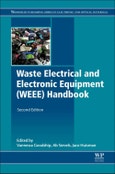Waste Electrical and Electronic Equipment (WEEE) Handbook, Second Edition, is a one-stop reference on current electronic waste legislation initiatives, their impact, and the latest technological considerations for reducing electronic waste (e-waste) and increasing the efficiency of materials recovery. It also provides a wide-range of global and corporate examples and perspectives on the challenges that face specific regions and companies, along with the solutions they are implementing in managing e-waste, offering further insights on how discarded products can be treated. Sections introduce the reader to legislation and initiatives to manage WEEE and discuss technologies for the refurbishment, treatment and recycling of waste electronics.
Further sections focus on electronic products that present particular challenges for recyclers, explore sustainable design of electronics and supply chains, discuss national and regional WEEE management schemes, and more.
Please Note: This is an On Demand product, delivery may take up to 11 working days after payment has been received.
Table of Contents
1. E-waste seen from a global perspective2. The e-waste development cycle e part I, introduction and country status
3. The e-waste development cycle, part IIdimpact assessment of collection and treatment
4. The e-waste development cycle, part IIIdpolicy & legislation,business & finance, and technologies & skills
5. Implementation road map and conditions for success
6. The WEEE forum and the WEEE label of excellence project
7. Reduction of hazardous materials in electrical and electronic equipment
8. The materials of waste electrical and electronic equipment
9. Refurbishment and reuse of waste electrical and electronic equipment
10. Mechanical methods of recycling plastics from WEEE
11. Recycling printed circuit boards
12. Recycling liquid crystal displays
13. Recycling cooling and freezing appliances
14. Recycling batteries
15. Rare earth metal recovery from typical e-waste
16. ErP e the European directive on ecodesign
17. Sustainable electronic product design
18. Waste electrical and electronic equipment management in Europe:learning from best practices in Switzerland, Norway, Sweden and Denmark
19. WEEE management in China
20. E-waste management in India
21. WEEE management in Japan
22. HP's WEEE management strategy
23. Siemens' WEEE management strategy
24. The history of the take-back and treatment of consumer waste electrical and electronic equipment at Philips
25. Creating a corporate environmental strategy including waste electrical and electronic equipment take-back and treatment
Authors
Vannessa Goodship University of Warwick, UK. Principal Research Fellow at the Warwick Manufacturing Group (WMG), a department at the University of Warwick providing research, education and knowledge transfer in engineering, manufacturing and technology. Her areas of specialism are plastics materials, their processing and recycling, and she has undertaken many research projects in these areas - most recently looking at multifunctional materials. She - like WMG - works at the interface of academia and industry. She has edited two books under the Woodhead imprint: Management, Recycling and Reuse of Waste Composites (2009) Waste Electrical and Electronic Equipment (WEEE) Handbook (2012). Ab Stevels Delft University of Technology, The Netherlands. Ab Stevels has done trailblazing work in making Applied EcoDesign into day-to-day business really happen and has researched in detail the setting up of take-back and recycling systems for electronics For these purposes tools and management procedures have been developed which have proven their strength through their practical success.Ab is the author of some 200 journal articles and conference contributions. Training courses on applied EcoDesign have been held at various universities (Delft, Stanford, TU Berlin,TU Vienna, TU Ostrava, the University of Arts and Design in Farnham (UK) , Mexico City, Hong Kong Poly, NTNU( Trondheim, Norway), Tsinghua University (Beijing) , and at various Philips departments and divisions around the globe and at other companies.
In 2013 he developed a 'MBA and Sustainability' course in cooperation with the University of Sao Paulo.
For his work in Applied EcoDesign he got an honorary degree from the University of Arts and Design. For his contributions in the field of recycling of electronics he got the "Cowbell Award"from the International Electronics Recycling Conference Organization. In 2014 the World Green Design Organization awarded him a "Green Design Contribution Award'. Jaco Huisman European Commission - Joint Research Center (JRC). Dr. Huisman holds a Master's degree in Chemical Engineering from Eindhoven University of Technology and a Ph.D. from Delft University of Technology. He was a Scientific Advisor to the UNU - SCYCLE and steering the group's research activities related to electronics recycling. He is involved in various international projects providing facts and figures for improving e-waste management. In the past, Dr. Huisman has been the lead author of the UNU study supporting the European Commission's 2008 Review of the EU WEEE Directive as well as multiple advanced e-waste country studies for various European countries. From 2013 to 2015 he was the scientific coordinator of the EU CWIT-project: "Countering WEEE Illegal Trade� and the H2020 project ProSUM: Prospecting Secondary raw materials in the Urban Mine. Currently with the European Commission DG Joint Research Center in the Sustainable Resources Directorate.








